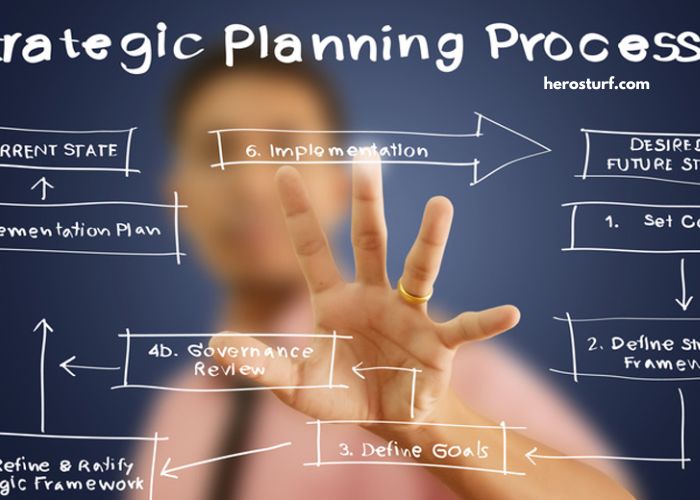Effective Business Planning Strategies That Work
Business planning is the cornerstone of every successful enterprise. A well-structured business plan not only provides direction but also helps manage risk, allocate resources efficiently, and attract investors. In today’s dynamic and competitive business landscape, relying on outdated methods isn’t enough. To stay ahead, organizations must adopt effective business planning strategies that are practical, innovative, and results-driven.
This article explores proven business planning strategies that drive real-world success, offering insights for entrepreneurs, startups, and established businesses alike.
Why Effective Business Planning Matters
A comprehensive and strategic business plan sets the foundation for success. It helps in defining goals, forecasting growth, identifying challenges, and aligning resources.
Aligning Goals with Vision
A business plan should reflect the company’s long-term vision. By aligning short-term objectives with that vision, businesses create a roadmap that ensures consistency in decision-making and goal-setting.
Minimizing Risk and Uncertainty
Strategic planning allows businesses to anticipate potential risks and prepare for them. This risk-mitigation process helps companies remain agile in an unpredictable environment.
Attracting Investors and Stakeholders
A compelling business plan with detailed strategies demonstrates professionalism and preparedness. This reassures investors and stakeholders that the business has a viable path to profitability and sustainability.
Key Components of a Strong Business Plan
Before diving into strategies, it’s essential to understand the structure of a solid business plan.
Executive Summary
The executive summary provides a snapshot of your entire business plan. It should include your mission, key goals, and a brief overview of your product or service.
Market Analysis
Understanding the target market, customer needs, and competition is essential. A market analysis highlights opportunities and threats that influence strategic decisions.
Organizational Structure
Outlining the company’s structure clarifies roles, responsibilities, and operational workflows. It is crucial for resource planning and performance management.
Financial Projections
Forecasting revenue, expenses, and cash flow gives your business a financial direction. Investors closely evaluate this section to determine the business’s viability.
Effective Business Planning Strategies That Work
Let’s explore time-tested and innovative strategies that yield measurable outcomes.
1. Set SMART Goals
Setting clear and actionable goals is a vital part of any business plan.
What Are SMART Goals?
SMART stands for:
-
Specific: Clearly define what you want to achieve.
-
Measurable: Ensure there’s a metric to track progress.
-
Achievable: Keep goals realistic and attainable.
-
Relevant: Align with the overall business vision.
-
Time-bound: Set a deadline to instill urgency.
Why SMART Goals Work
They bring structure and accountability. When everyone knows the exact target, productivity increases and confusion reduces.
2. Conduct Thorough SWOT Analysis
Analyzing the internal and external environment is crucial to identify strategic priorities.
Strengths and Weaknesses
Evaluate internal aspects like resources, brand value, and operational efficiency.
Opportunities and Threats
Consider market trends, regulatory changes, and economic conditions to forecast external impacts.
Leveraging the SWOT for Strategy Development
Once your SWOT is clear, align your strategy to build on strengths, minimize weaknesses, seize opportunities, and mitigate threats.
3. Focus on Data-Driven Decision Making
In the digital age, data is the new currency. Using data intelligently can transform business strategies.
Implementing Analytics Tools
Use CRM systems, Google Analytics, BI tools, and other software to gather insights about sales, customer behavior, and performance.
Predictive Modeling
Advanced tools use machine learning and AI to anticipate market trends and customer needs, helping businesses make proactive decisions.
4. Prioritize Financial Planning
Without a clear financial blueprint, even great ideas can fail.
Budgeting
Create detailed budgets for departments and projects. Include variable and fixed costs, revenue expectations, and contingency plans.
Break-Even Analysis
Understanding when your business will start making a profit is essential for planning investment and scaling efforts.
Cash Flow Forecasting
Forecast cash inflows and outflows to ensure liquidity and avoid unexpected shortfalls.
5. Continuous Market Research
Markets evolve rapidly. Staying updated with changes in consumer preferences, technologies, and competition is vital.
Competitor Analysis
Regularly evaluate what competitors are doing. Benchmark your services, pricing, and marketing strategies to stay ahead.
Customer Feedback Loop
Encourage and act on customer feedback to enhance products, services, and user experience.
6. Embrace Flexibility and Agility
Rigid plans often fail in a fast-changing world. Agility allows businesses to pivot quickly and effectively.
Adaptive Planning
Build flexibility into your strategy to accommodate sudden changes like market disruptions, new technologies, or economic shifts.
Scenario Planning
Develop multiple action plans based on best-case, worst-case, and most-likely scenarios.
7. Align Team and Culture with Strategy
No business strategy can succeed without a team that understands and supports it.
Internal Communication
Ensure everyone knows the strategic goals. Use internal platforms and regular meetings to keep teams aligned.
Training and Development
Invest in skill-building to empower employees and ensure they contribute effectively toward strategic goals.
8. Use Technology to Enhance Efficiency
Technology is a game-changer in modern business planning.
Project Management Tools
Platforms like Trello, Asana, and Monday.com streamline planning, task management, and collaboration.
Automation
Automate repetitive tasks like invoicing, inventory management, and marketing to save time and reduce errors.
Cloud Computing
Enable remote work, data sharing, and real-time collaboration with cloud-based tools.
9. Plan for Scalability
Your business plan should accommodate future growth.
Infrastructure Planning
Prepare your systems, teams, and operations to handle increased demand.
Resource Allocation
Ensure adequate resources are in place to support expansion – from hiring to supply chain planning.
Strategic Partnerships
Collaborate with vendors, distributors, and other partners to fuel growth.
10. Monitor, Review, and Revise Regularly
Planning is not a one-time activity. Continuous improvement is crucial for long-term success.
Key Performance Indicators (KPIs)
Track metrics such as sales growth, customer acquisition cost, ROI, and employee productivity.
Quarterly Reviews
Hold regular review meetings to evaluate progress and adjust the strategy as needed.
Embrace Feedback
Incorporate feedback from team members, customers, and stakeholders to refine the plan.
Bonus Tips for Effective Business Planning
Let’s explore a few additional tactics that elevate your planning process.
Leverage Industry Benchmarks
Compare your business performance with industry standards. This helps in setting realistic targets and identifying gaps.
Develop an Exit Strategy
Whether it’s an IPO, merger, or sale, having an exit plan provides direction for long-term goals.
Keep It Simple
A business plan should be easy to understand. Avoid jargon and keep the focus on value-driven objectives.
Foster Innovation
Encourage innovation in products, services, and processes. Allocate time and budget for experimentation and creative thinking.
Protect Intellectual Property
Include IP strategy in your business plan if your product or service relies on innovation or unique technology.
Common Mistakes to Avoid in Business Planning
Avoiding pitfalls is just as important as adopting good practices.
Lack of Research
Insufficient market or financial research leads to flawed strategies.
Over-Optimism
Overestimating sales or underestimating expenses can derail execution.
Ignoring Competition
Not accounting for market competition is a common planning error.
Failing to Update the Plan
An outdated plan can mislead decision-making and affect growth.
Conclusion: Building a Future-Proof Business Plan
Effective business planning is a continuous, evolving process. It goes beyond writing down ideas – it’s about building a strategic framework that aligns goals, anticipates risks, manages resources, and encourages innovation.
By implementing the strategies outlined in this article — from setting SMART goals and conducting SWOT analyses to embracing agility and technology — businesses can lay the groundwork for sustainable growth and long-term success.
The most successful business plans are not static documents but living blueprints that adapt and grow with the organization. Commit to strategic thinking, remain agile, and use data and feedback to continuously refine your approach. That’s the key to making your business plan not only effective but transformative.



